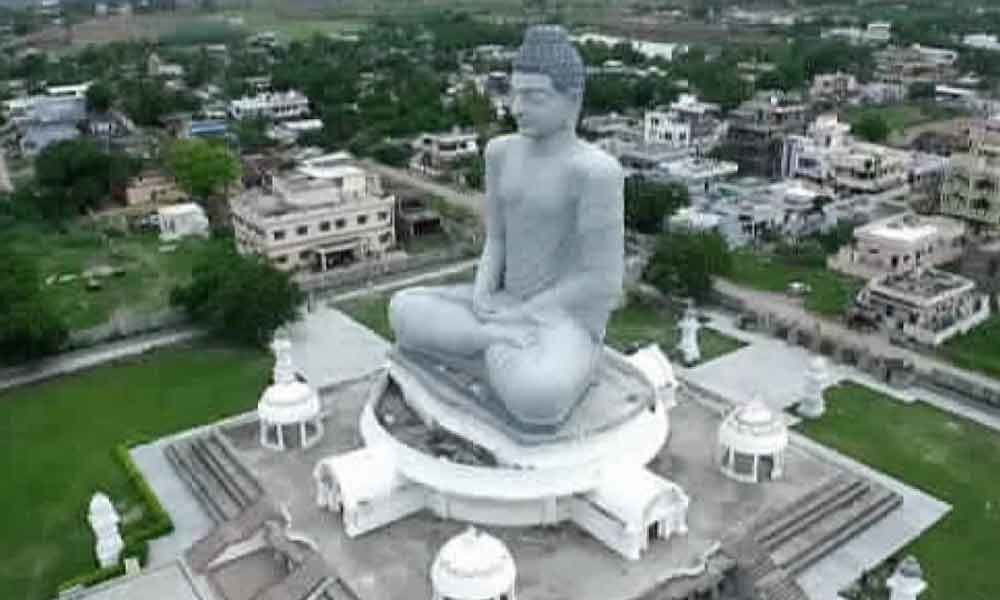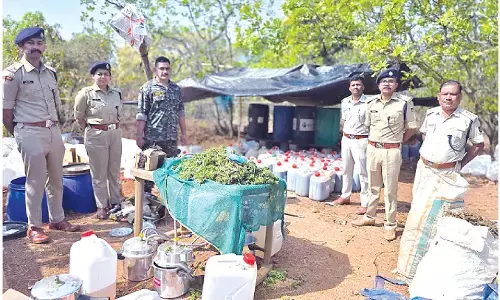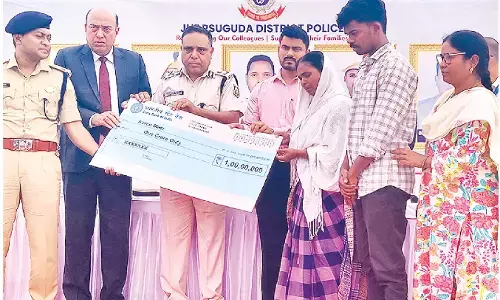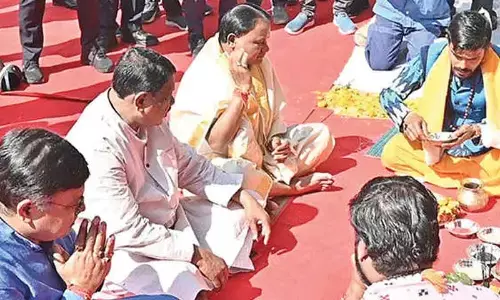AP, TS put governance on back burner

It is almost 90 days since the Modi 0.2 government had come to power and if one looks back as to what it has done so far, the list appears to be quite satisfactory as far governance is concerned.
It is almost 90 days since the Modi 0.2 government had come to power and if one looks back as to what it has done so far, the list appears to be quite satisfactory as far governance is concerned.
At the same time, the BJP has also been systematically and aggressively trying to implement its agenda of making inroads to areas where it has little presence or no presence at all.
It has successfully completed the budget session and has set a target of making the country a $ five trillion economy by the end of its five-year term.
It can also boast of taking historic decisions like passing Triple Talaq Bill and scrapping of Article 370 and 35 A and launching Chandrayaan. In the words of Union Minister for Information and Broadcasting Prakash Javadekar, it was a period which was exemplified by "speed, skill and scale."
The setting up of the National Research Foundation and National Sports Education Board and the launch of 'Study in India' programme can be claimed as some of the initiatives taken in the education sector.
The government had taken steps to codify labour laws and help small and medium-sized enterprises.
But when it comes to the two Telugu States, this spirit of governance seems to be missing. While dates and auspicious time are still being finalised in Telangana for ushering in governance which would be unique, in the neighbouring State of Andhra Pradesh, a unique governance but of a different kind is being seen.
The decisions and statements of the government are pushing the people into state of confusion. Development has been put on hold as the government suspects large scale corruption in everything.
It had taken certain major decisions like ordering stoppage of all works on Polavaram project, cancelling of tenders and issuing notification for re-tendering despite objections from the Centre.
It has also put a ban on sale of sand which has affected the construction industry. It has even cancelled the list of poor beneficiaries who were given two-bedroom houses, something which is normally not done.
The recent flood in the river Krishna and the high political drama by both the TDP leaders and the Ministers and the twitter war resulted in ignoring the common man who was left high and dry and flood politics veered around the rented house of the Opposition leader.
The fact is that flood management has not been done as effectively as it should have been.
On the top of it, statements by Minister for Municipal Administration Botsa Satyanarayana that Amaravati was flood-prone and hence the party was discussing about the future of capital city of Amaravati has now become a cause of worry for all those who had given land under land pooling scheme.
The government, it appears, is in no mood to go ahead with the grandiose plan to have capital city of international standards and if speculations are to be believed, it is even thinking of shifting the capital to some other place.
The confusion got further confounded as Chief Minister Y S Jagan Mohan Reddy has been maintaining stoic silence on this issue. It could be certainly a strategic move but then the amount of turmoil it causes to the general public is something that needs to be taken note off.
The State BJP threatens that if the YSRCP government resorts to any such move, it will take up massive agitation. They too have a point. They say that any such move would amount to "Tughlaq style" rule.
The State BJP president Kanna Lakshminarayana said that Tughlaq had shifted his capital from New Delhi to Daulatabad, which was 700 miles away which resulted in large scale adverse impact on the common man and two years later was forced to come back to Delhi.
He is of the opinion that since the foundation stone for the capital city was laid by Prime Minister of India Narendra Modi and since people had given land believing the previous government, the successor government cannot go back as government policies need to have continuity. If need be some changes here and there can be made but cannot be dumped lock stock and barrel.
Even as political storm over this continues to rage, the stand taken by the government that Kia Motors, the first and only major manufacturing unit in Andhra Pradesh had not benefitted the State and was resulting in the government paying huge amounts as incentives and hence it was not a viable project, has led to greater controversy.
Despite serious efforts, no major manufacturing unit had come even when Andhra Pradesh and Telangana were united. Though Volkswagen was to enter the State, for various reasons, it landed in controversy and moved out.
After bifurcation, the Kia Motors for which various States like Gujarat, Tamil Nadu, Maharashtra and Karnataka vied had finally chosen Andhra Pradesh. The captains in the government whether they are from the political wing or from the executive, should remember one thing that the government should not expect that the State would be flooded with funds soon after an industry is set up.
At the same time, attracting such industry even if it puts some financial burden on the State government it improves the profile of a State in the global market.
RVS Rudraraju, former chairman of CII Andhra Pradesh was right when he said that incentives were essential to attract new investments into any State.
"There is so much competition among States to attract investments. So, it will be very difficult for any State to get investments without offering incentives and providing requisite facilities."
On the AP government's announcement to review incentives offered to Kia Motors by erstwhile TDP government, he said it would send wrong signals to investors. "If the previous government has extended any undue favours to Kia Motors, then current government should investigate and find out. Also, it can directly talk to the company rather than making public announcement."
It is a known fact that reviewing industrial incentives offered by the previous governments would set a bad precedence. "The government can investigate if something wrong has been committed.
But blanket review of incentives will mar the image of the State. In the name of transparent governance, dirty linen need not be washed in the open on every issue," Rudraraju said.
Ever since India opened its doors for Foreign Direct Investment, it has set up Special Economic Zones (SEZ) throughout the country in order to promote competitive business environments. Both developers and occupiers of SEZs enjoy substantial long-term tax holidays and concessions.
Presently, units in SEZs enjoy 100 percent income tax exemptions on export income for the first five years, 50 percent for the next five years thereafter, and 50 percent of the ploughed back export profit for another five years.
Other benefits include a refund of GST on goods imported by units and developers of SEZs, easy refund procedure of input GST paid on procurement of goods and services if any, and minimal compliance requirement and return filing procedure.
The government should examine the policies in the neighbouring States like Maharashtra and Tamil Nadu where automobile industries are well established. They should also realise that major automobile manufacturers like Mercedes and Audi did not enter Maharashtra overnight. Even they had to be given incentives as per the policy.
Though Maharashtra is a leading manufacturer of automobile and auto components in India, its industrial policy provides industrial promotion subsidy, interest subsidy, electricity duty exemption, acquisition of land, total exemption from stamp duty etc.
Further, the acquisition of land and term loans by MSMEs and large-scale industries are completely exempt from the payment of stamp duty. MSMEs are also exempt from payment of duty on the electricity consumed as well as a full exemption on fixed capital investments to biotechnology units for a fixed period. There is saying in Hindi, "Kuch pane ke liye kuch khona padta hai."
Benefits of encouraging industrial growth would be seen only in the long run and till then one should know how to do the balancing act. What is required from the bureaucracy is to say, 'Yes Chief Minister, we need to implement this policy this way' and not just 'Yes' to everything the political bosses say.




